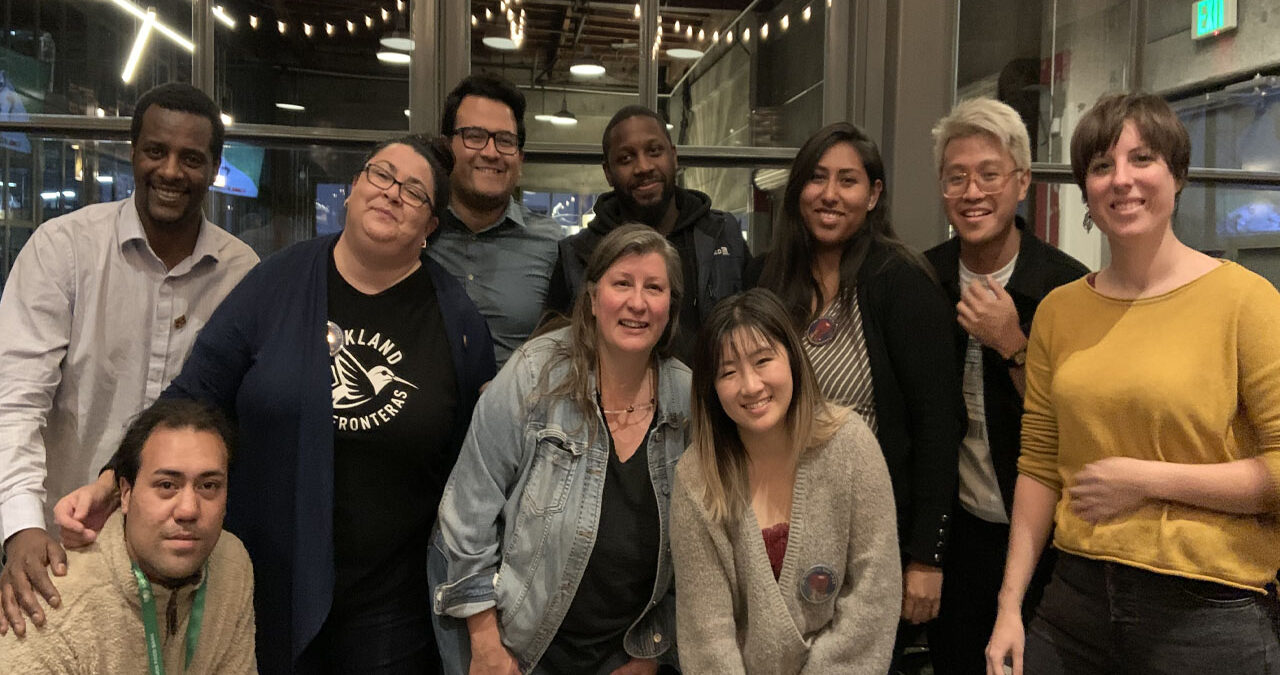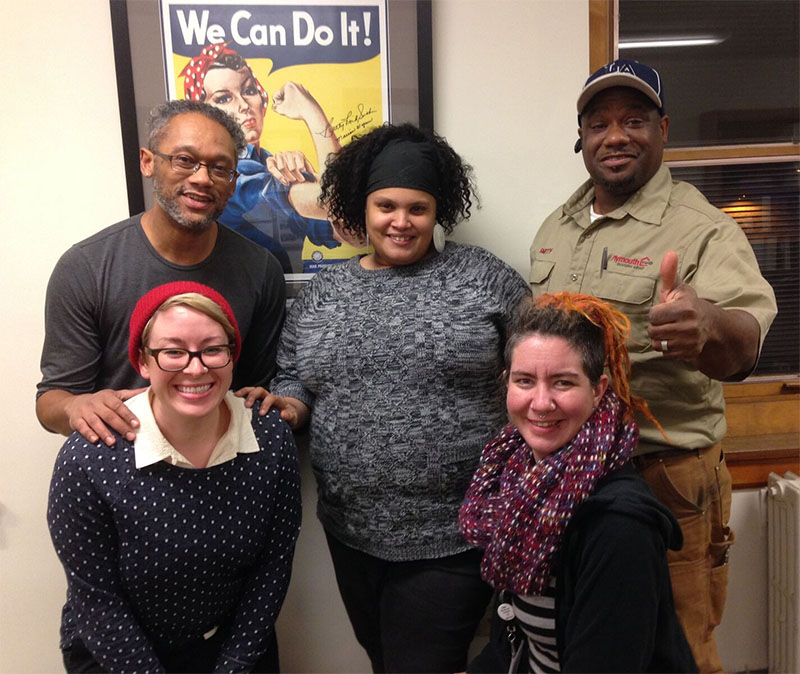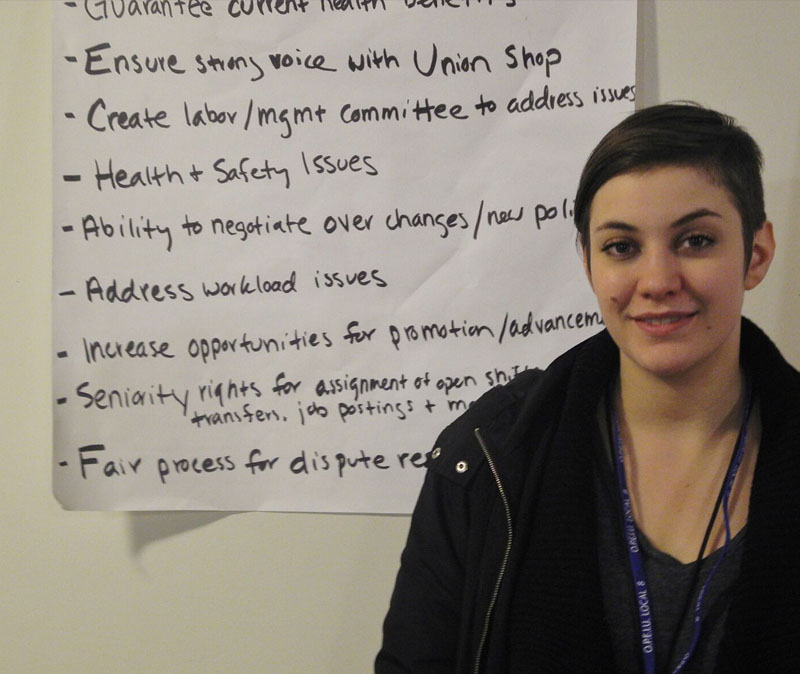

Nonprofit employees uniting to empower our
workplaces and strengthen our communities
Who We Are
We are the union for nonprofit employees. NEU – Nonprofit Employees United – is a collective of thousands of non-profit union members. Members belong to the Office and Professional Employees International Union, AFL-CIO and work in nonprofit advocacy and social service organizations all over the country.
Why Join NEU
Our members have improved their nonprofit workplaces by raising wages to help members afford to live in the communities they serve; securing better health care and paid leave benefits; creating systems for employee input and involvement to ensure more effective programs and services; negotiating for policies to make work safer and reduce burnout and more. We work to build strong labor standards to reflect the value of the work we do for the greater good of society.
We’re Nonprofit Employees United
“One reason we formed our union is because employees who do our kind of work need greater respect and value from society. If more of us in social services were united and calling for better standards, we’d have even more power to make a difference.”
“On a daily basis we fight for the rights of our clients. Our union makes it easier for us to do this hard and rewarding work. We have benefits and an economic future we can depend on for ourselves and our families, which means we can afford to stay longer at a job we love. When morale and turnover improve, that helps our agencies do what they do best.”
“A voice on the job, transparency, consistent policies were some of the reasons we united in our own employee organization. We felt a union would empower us to advocate for ourselves in a productive and collaborative way, and be a positive force for our organization.”

Declaration of Nonprofit Worker Rights
Social service and housing workers provide the tools and support necessary to help everyone in our communities reach their full potential. Although it requires a unique set of skills and training, this work is most often characterized by substandard wages, benefits and working conditions that threaten the well-being of the workers and their families. We must build a foundation for minimum labor standards in this industry to reflect the value of the work and to strengthen our communities and hold our elected leaders accountable for providing necessary funding.
Wages
Compensation must reflect median area income allowing workers to live in the community they serve, provide for themselves and their families, keep up with rising cost of living and stay in jobs longterm without having to rely on social services themselves. Longevity premiums should recognize years of service.
Minimum Staffing and Safety
Every shift in supportive housing and emergency shelters must be covered by a minimum of two qualified workers to provide as safe an environment as possible.
Training
Must be uniform and include basic safety and crisis prevention training immediately after hire, with additional trainings that prepare workers to deal with the practicalities of their positions and contextualize their clients’ lived experiences.
Traumatic Experiences and Self-Care
Vicarious trauma leads to compassion fatigue and burnout, contributing to high turnover.
- Provide paid leave after experiencing a traumatic event to allow workers to recover without financial hardship.
- Explore other solutions such as paid self-care leave, expanded access to mental health services through Employee Assistance Programs, gym memberships or other solutions.
Medical Insurance and Insurance for Families
All social service workers should be provided medical coverage that allows them to care for themselves and their families. Currently many workers must cover their children through Medicaid.
Retirement Benefits
Employer contributions to retirement plan that will allow workers to retire after a career in social service.
Just Cause and Grievance Process
Just Cause and a fair grievance process provide an accessible, fair method for conflict resolution in the workplace.
Seniority
Seniority protections provide a consistent, unbiased standard to act as the determining factor in decisions such as promotions, transfers, layoffs, and rehires.
Scheduling and differentials
- In recognition of the burden it puts on a worker when their schedule changes unexpectedly, a pay differential for an unexpected schedule change or when a worker has to stay past the end of their shift.
- Differential pay for evening, night, and weekend work.
Voice on the Job
Protect and honor the legal right of workers to organize to improve the standards in their work life.
Where NEU Members Work
- ACLU MARYLAND
- ADVOCATES FOR HUMAN RIGHTS
- ALAMEDA COUNTY COMMUNITY FOOD BANK
- AMERICAN JEWISH WORLD SERVICE
- ARISE CHICAGO
- ASSOC of COMM COLLEGE TRUSTEES
- ASIAN PACIFIC AMERICAN LABOR ALLIANCE
- ANTI-VIOLENCE PROJECT
- BHR- BEHAVIORAL HEALTH RESOURCES
- BIOBUS
- BRILLIANT CORNERS
- CASA LATINA
- CENTER FOR BOOK ARTS
- CENTER FOR DOMESTIC PEACE
- CENTER FOR POLICING EQUITY
- CENTER FOR RESPONSIBLE LENDING
- CITIBAR JUSTICE CENTER
- CLASP
- COMPASS FAMILY SERVICES
- COMPASS HOUSING ALLIANCE
- COMMUNITY FORWARD SF
- COMMUNITY SOLUTIONS
- CONSEJO COUNSELING & REFERRAL SERVICES SF.
- CRISIS CONNECTIONS
- DC SAFE
- DEFENDERS OF WILDLIFE
- DISABILITY RIGHTS OHIO
- DISABILITY RIGHT WASHINGTON
- EMILYS LIST
- ECS – EPISCOPAL COMMUNITY SERVICES SF
- FAIR SHOT TEXAS
- FLORENCE IMMIGRANT AND REFUGEE RIGHTS PROJECT
- FREEDOM HOUSE
- FRIENDS OF YOUTH
- FORTERRA
- GARMENT WORKER CENTER
- GLIDE FOUNDATION
- GOOD SAMARITAN FAMILY RESOURCE CENTER
- GUIDE DOGS OF AMERICA
- GUTTMACHER INSTITUTE
- HAMILTON FAMILIES
- HOSPITALITY HOUSE
- HOUSING RIGHTS COMMITTEE OF SAN FRANCISCO
- IFES
- IMPACT JUSTICE
- INCLUDENYC
- INNER CITY LAW
- INSTITUTE FOR LOCAL SELF-RELIANCE
- INTERNATIONAL RESCUE COMMITTEE (IRC) ABILENE
- INTERNATIONAL RESCUE COMMITTEE (IRC) DENVER
- INTERNATIONAL RESCUE COMMITTEE (IRC) DALLAS
- INTERNATIONAL RESCUE COMMITTEE (IRC) SAN JOSE
- INTERNATIONAL RESCUE COMMITTEE (IRC) OAKLAND
- INDEPENDENT LIVING RESOURCES CENTER
- JEWISH COMMUNITY ACTION
- LA CASA NORTE
- LAND STEWARDSHIP PROJECT
- LEADERSHIP CONFERENCE FOR CIVIL AND HUMAN RIGHTS
- LIGHTHOUSE FOR THE BLIND AND VISUALLY IMPAIRED
- LOW INCOME HOUSING INSTITUTE
- LUCIE’S PLACE
- LYRIC
- MADRE
- MINNESOTA FREEDOM FUND
- MINN. YOUTH COLLECTIVE
- MINNESOTA VOICE
- MOVE TEXAS
- NAT. ASSOC. OF COUNTY & CITY HEALTH OFFICIALS
- NATIONAL NETWORK OF ABORTION FUNDS
- NDI – NATIONAL DEMOCRATIC INSTITUTE
- NED – NATIONAL ENDOWMENT FOR DEMOCRACY
- NEW ISRAEL FUND
- MDC – MAKING A DIFFERENCE IN COMMUNITY
- NORTHWEST IMMIGRANT RIGHTS PROJECT
- NORTHWEST JUSTICE PROJECT
- OREGON LEAUGE OF CONSERVATION VOTERS
- SAGE
- ST. VINCENT DE PAUL SOCIETY SF
- SENIOR & DISABILITY ACTION
- SF-MARIN FOOD BANK
- SOLID GROUND
- SOLIDARITY CENTER
- SPEECH AND LANGUAGE DEVELOPMENT CENTER
- STUDENT BORROWER PROTECTION CENTER
- PARTNERS GLOBAL
- PENNSYLVANIA VOICE
- PLANNED PARENTHOOD OF METROPOLITAN WASHINGTON DC INC.
- PLANNED PARENTHOOD KEYSTONE
- PLYMOUTH HOUSING
- PRINTED MATTER
- REPRESENT US
- ROOTS YOUNG ADULT SHELTER
- YOUTH CARE
- UNITED WAY BAY AREA
- UNITED WAY CA CAPITAL REGION
- WORKER JUSTICE WISCONSIN
5 Steps to Form a Union
![]() Talk to Co-workers/Gather Information
Talk to Co-workers/Gather Information
What issues do you care most about? Any common themes? Do other co-workers share your interest in exploring forming a union? Contact us for help getting started.
![]() Form an Organizing Committee of Representative Co-Workers
Form an Organizing Committee of Representative Co-Workers
The Organizing Committee educates co-workers about the benefits of unionizing and your rights under the law, motivates others to take action with confidence, identifies common workplace concerns and helps plan how to build a strong union.
![]() Build Majority Support
Build Majority Support
Once your Organizing Committee is in place and you have a good plan, you’re ready to take action and make your campaign public by talking to all of your co-workers to make sure everyone has an opportunity to be involved. Cards or petitions are signed to show support for having a union.
![]() Make Your Union “Official”
Make Your Union “Official”
Now you can ask your employer to voluntary recognize your union or you can request the National Labor Relations Board to hold a secret ballot election.
![]() Win a Strong Contract
Win a Strong Contract
Once your union is official, you and your co-workers will negotiate a legally binding contract with your employer that puts in writing all terms of employment. When negotiations are over you vote to approve the contract.
Questions about NEU? Ready to get started? Fill out the form below and a member of our team will be in touch shortly.




